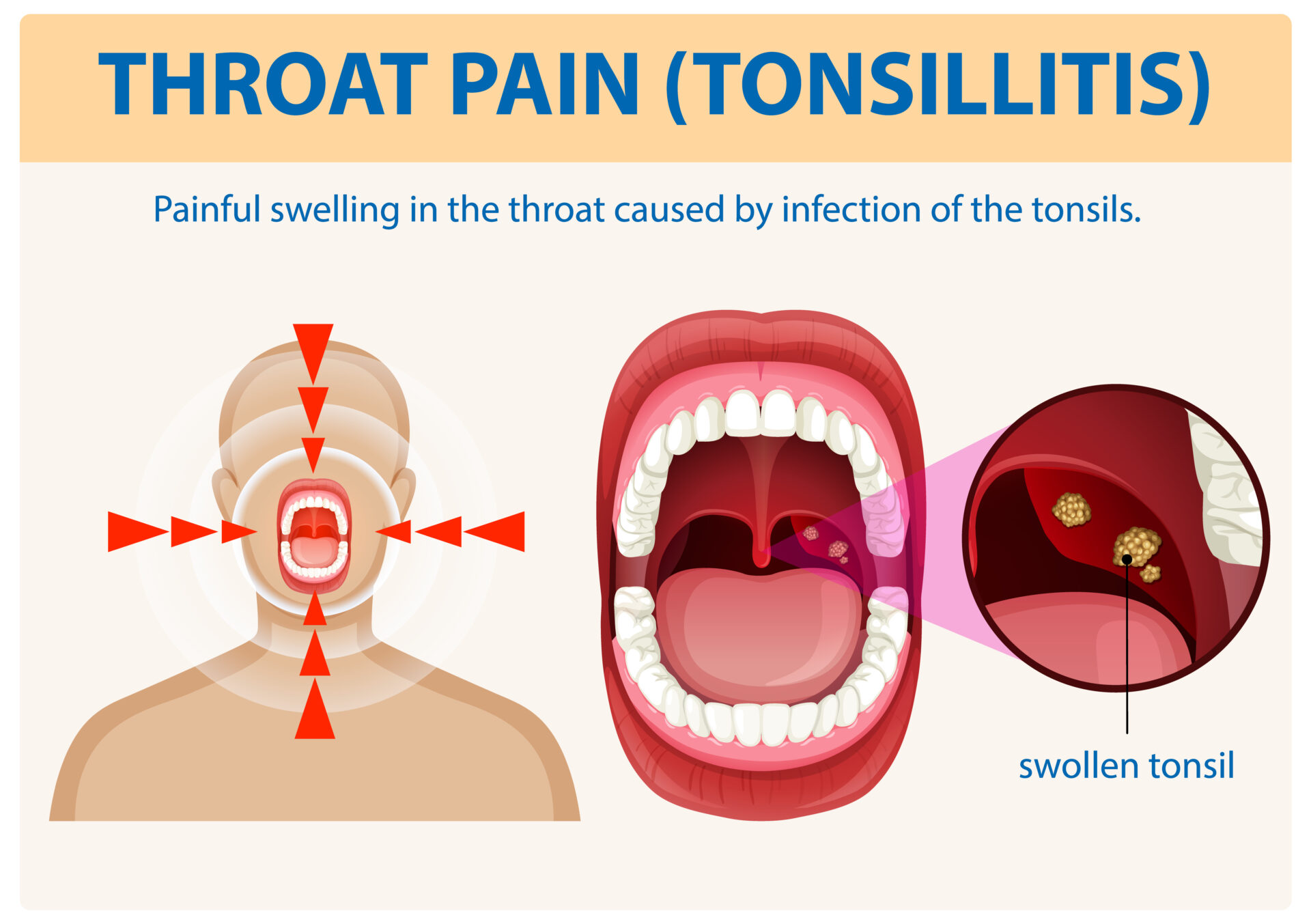Is Tonsillitis Contagious? Understanding Causes, Transmission, and Recovery Tips
Contents
- 1 Is Tonsillitis Contagious? Understanding Causes, Transmission, and Recovery Tips
- 1.0.0.0.0.1 Read DISCLAIMER
- 1.0.0.0.0.2 The material presented here is for general informational and educational purposes only and is not medical advice. Although we attempt to provide current and accurate information, this blog should not be used as a replacement for professional medical consultation, diagnosis, or treatment. In all cases, consult your physician or an accredited medical practitioner with regards to any medical condition or treatment. Do not ignore professional medical advice or wait for it on the basis of information provided by this blog. In a medical emergency, call emergency services immediately.
- 1.1 What Exactly Is Tonsillitis?
- 1.2 Causes of Tonsillitis: Viral vs. Bacterial
- 1.3 Is Tonsillitis Contagious? The Real Answer
- 1.4 How Tonsillitis Spreads in Daily Life
- 1.5 Emotional Impact of Contagious Illness
- 1.6 How Long Is Tonsillitis Contagious?
- 1.7 Recovery Tips for Tonsillitis
- 1.8 Preventing Tonsillitis from Spreading
- 1.9 Complications: Why Ignoring Tonsillitis Can Be Risky
- 1.10 When to Seek Medical Attention
- 1.11 Living with Recurrent Tonsillitis
- 1.12 The Human Side of Recovery
- 1.13 Conclusion: Contagious but Controllable
- 1.14 FAQs with Answers
Is tonsillitis contagious? Learn about its causes, transmission, symptoms, and recovery tips to protect yourself and prevent spreading infections.
Read DISCLAIMER
The material presented here is for general informational and educational purposes only and is not medical advice. Although we attempt to provide current and accurate information, this blog should not be used as a replacement for professional medical consultation, diagnosis, or treatment. In all cases, consult your physician or an accredited medical practitioner with regards to any medical condition or treatment. Do not ignore professional medical advice or wait for it on the basis of information provided by this blog. In a medical emergency, call emergency services immediately.
Imagine waking up with a throat that feels like it’s on fire, swallowing becoming a painful chore, and a sudden heaviness that makes even talking a burden. This scenario is all too familiar for anyone who has had tonsillitis. It is more than just a sore throat—it’s an inflammation of the tonsils, those small, oval-shaped glands at the back of your throat that often go unnoticed until they swell, hurt, or get infected.
The burning question for many is whether tonsillitis is contagious. The answer, as with most health conditions, is not black and white. It depends on the cause. Tonsillitis can be triggered by viruses or bacteria, and the contagiousness varies accordingly. Beyond just the science of how it spreads, there’s also the emotional and practical aspect—how do you protect your loved ones, how long should you stay home, and what can you do to heal faster?
This blog dives deep into all of these questions. By the end, you’ll not only know whether tonsillitis is contagious, but also how it spreads, the red flags to watch out for, and how to recover without passing it on.

What Exactly Is Tonsillitis?
The tonsils are part of your immune defense system, acting as gatekeepers against pathogens that enter through the mouth or nose. When they get inflamed, the condition is called tonsillitis. The inflammation may be mild, lasting only a few days, or more severe, requiring medical attention.
Symptoms typically include a sore throat, difficulty swallowing, swollen tonsils that may appear red or have white patches, fever, and swollen lymph nodes in the neck. Some people also experience bad breath, ear pain, or fatigue. In children, tonsillitis may cause irritability, poor appetite, or even drooling if the pain makes swallowing too difficult.
Understanding the root cause is crucial because that determines not only the treatment but also whether the condition can spread to others.
Causes of Tonsillitis: Viral vs. Bacterial
The majority of tonsillitis cases are caused by viruses. These include the same culprits responsible for common colds and flu. Viral tonsillitis often accompanies other symptoms like runny nose, cough, or body aches.
Bacterial tonsillitis, on the other hand, is most commonly caused by group A Streptococcus bacteria, the same organism responsible for strep throat. Bacterial tonsillitis tends to be more severe, with higher fevers, pronounced throat pain, and pus-filled tonsils.
This distinction is important because viral tonsillitis often resolves on its own with supportive care, while bacterial tonsillitis may require antibiotics. But both forms raise the question: can you pass it on to others?

Is Tonsillitis Contagious? The Real Answer
Yes, tonsillitis can be contagious—but how much depends on the underlying cause.
Viral tonsillitis spreads the same way colds do: through tiny droplets released when someone coughs, sneezes, or talks. Touching contaminated surfaces and then your face can also spread the infection.
Bacterial tonsillitis is also contagious, particularly strep throat. Close contact with someone who has untreated bacterial tonsillitis significantly increases the risk of catching it. This is why outbreaks often occur in schools, households, or any environment where people are in close quarters.
The contagious period also varies. Viral tonsillitis is usually most contagious when symptoms first appear and during the peak of illness. Bacterial tonsillitis is contagious until at least 24 hours after starting antibiotics, which is why treatment not only helps the patient but also protects those around them.
How Tonsillitis Spreads in Daily Life
Think of how often you share space, air, or even food with those around you. A simple sip from the same glass, a sneeze without covering, or even talking in close proximity can spread the germs responsible for tonsillitis.
Children are especially vulnerable because they tend to have close physical interactions with their peers, may not wash hands frequently, and often share toys or utensils. Adults, especially those in caregiving roles or crowded workplaces, are not exempt.
It’s worth noting that not everyone exposed will get tonsillitis. Your immune system plays a big role in determining whether you develop the infection or simply fend it off.
Recognizing When It’s More Than Just a Sore Throat
Not every sore throat means tonsillitis, but knowing the difference helps you decide when to be cautious. A sore throat from allergies or mild viral infections usually improves within a day or two. Tonsillitis, however, tends to worsen, with progressively painful swallowing, visible swelling of the tonsils, and systemic symptoms like fever and fatigue.
If white or yellow patches appear on the tonsils, if swallowing becomes severely painful, or if there’s difficulty breathing, this is more than a casual sore throat. These symptoms suggest a more serious infection that could be contagious and may require medical intervention.
Emotional Impact of Contagious Illness
There’s also an emotional layer to dealing with contagious illnesses like tonsillitis. Parents often worry about their child missing school or infecting siblings. Adults may feel guilty about spreading germs at work or being unable to fulfill responsibilities. Some people feel embarrassed about having “bad breath” or avoiding social contact because of throat pain.
It’s important to remember that getting sick is not a personal failing—it’s a natural part of being human. The focus should be on responsible care and preventing unnecessary spread, not on blame or shame.

How Long Is Tonsillitis Contagious?
The contagious window depends on whether the cause is viral or bacterial. Viral tonsillitis can be contagious for as long as symptoms last, sometimes up to two weeks. Bacterial tonsillitis, especially strep, remains contagious until at least 24–48 hours after antibiotics are started. Without treatment, the contagious period may last much longer.
During this window, practicing good hygiene and limiting close contact with others can significantly reduce transmission.
Recovery Tips for Tonsillitis
Healing from tonsillitis requires patience and self-care. Rest is essential because the body is channeling energy into fighting infection. Hydration soothes the throat and prevents dehydration, while warm teas, broths, and soft foods make swallowing easier. Saltwater gargles and throat lozenges may help reduce discomfort.
For viral tonsillitis, supportive care is usually enough. For bacterial tonsillitis, completing the full course of prescribed antibiotics is crucial, even if symptoms improve early. Stopping treatment too soon can lead to recurrence or complications.
It’s also important to monitor symptoms. If pain becomes severe, if fever spikes, or if you notice difficulty breathing or swallowing, medical evaluation is necessary. In rare cases, untreated tonsillitis can lead to abscesses or spread of infection.
Preventing Tonsillitis from Spreading
Prevention often comes down to hygiene. Washing hands frequently, avoiding sharing utensils or drinks, covering coughs and sneezes, and disinfecting commonly touched surfaces go a long way.
If you are the one sick, staying home during the contagious period is both a kindness to others and a chance for your own body to heal without added stress. Think of it not as lost time but as an investment in recovery and protection for those around you.
Complications: Why Ignoring Tonsillitis Can Be Risky
While most cases resolve with care, untreated tonsillitis—particularly bacterial—can lead to complications. These include peritonsillar abscesses, difficulty breathing, or spread of infection to nearby tissues. In chronic cases, repeated tonsillitis can affect quality of life, leading some to consider tonsillectomy.
Complications are reminders of why early recognition, responsible care, and timely treatment are so important.
When to Seek Medical Attention
You should consult a healthcare provider if tonsillitis symptoms last longer than a week, worsen instead of improving, or are accompanied by severe fever, difficulty breathing, or inability to swallow fluids. Children who show extreme fussiness, drooling, or dehydration signs should also be evaluated quickly.
Medical care is not just about treating the illness—it’s also about ensuring the infection doesn’t progress to something more serious or contagious to others.
Living with Recurrent Tonsillitis
For some, tonsillitis is not a one-time ordeal but a recurring problem. Frequent infections can disrupt daily life, education, or work. In these cases, doctors may discuss the possibility of tonsil removal, known as tonsillectomy. While it’s not always necessary, it can bring relief for those whose quality of life is consistently impacted.
Recurrent tonsillitis can also take an emotional toll, leaving people anxious about when the next episode will strike. Having a proactive plan for management and prevention helps reduce that burden.
The Human Side of Recovery
Think of recovery not just as healing the throat but also restoring your sense of normalcy. Sharing a warm meal with your family, laughing without pain, or simply breathing comfortably again are milestones that highlight the importance of self-care.
The journey through tonsillitis is uncomfortable, yes, but it also teaches patience, the value of rest, and the importance of protecting those around you. When seen through this lens, recovery becomes more than just waiting for symptoms to fade—it becomes an act of resilience and care.
Conclusion: Contagious but Controllable
So, is tonsillitis contagious? The answer is yes, in most cases, whether viral or bacterial. But the good news is that contagion can be controlled with responsible actions, awareness, and proper treatment.
By understanding the causes, recognizing the symptoms, and practicing good hygiene, you can protect yourself and others. Recovery may take time, but it is possible to heal fully while preventing further spread.
Ultimately, tonsillitis reminds us of how interconnected our health is. One person’s mindful care can prevent another’s illness. And that is the real power in knowing not only whether tonsillitis is contagious but also how to respond wisely when it strikes.
FAQs with Answers
- Is tonsillitis always contagious?
Tonsillitis is often contagious when caused by viruses or bacteria, especially in its early stages. However, if it’s due to allergies or chronic irritation, it is not contagious. - How long is tonsillitis contagious for?
Viral tonsillitis can be contagious for up to a week, while bacterial tonsillitis caused by strep throat may remain contagious until antibiotics have been taken for at least 24–48 hours. - Can you get tonsillitis from kissing?
Yes, kissing can transmit the bacteria or viruses responsible for tonsillitis, since they are spread through saliva and close contact. - What are the main causes of tonsillitis?
Tonsillitis is mainly caused by viral infections such as adenovirus or influenza, and bacterial infections like Streptococcus pyogenes. Other triggers include irritants, smoke, or allergies. - How do I know if my tonsillitis is bacterial or viral?
Bacterial tonsillitis often comes with high fever, swollen lymph nodes, and white patches on the tonsils, while viral tonsillitis may present with cough, runny nose, and milder symptoms. - Can tonsillitis spread through sharing utensils?
Yes, sharing spoons, forks, glasses, or water bottles can spread the infection, as bacteria and viruses linger in saliva. - What are the red flag symptoms of tonsillitis?
Severe sore throat, difficulty breathing, persistent high fever, inability to swallow fluids, and swelling on one side of the throat are red flags that require urgent medical attention. - Is tonsillitis more common in children?
Yes, children are more prone to tonsillitis because their immune systems are still developing, and they are more frequently exposed to infections in school or daycare settings. - Can adults get tonsillitis too?
Yes, adults can get tonsillitis, although it tends to occur less frequently. When it does, it may lead to more severe symptoms or chronic inflammation. - How can I prevent catching tonsillitis?
Practicing good hygiene such as frequent hand washing, avoiding close contact with sick individuals, and not sharing utensils can lower the risk of infection. - What are the home remedies for faster recovery?
Warm saltwater gargles, honey in warm tea, hydration, rest, and humidified air can help soothe symptoms and speed up recovery from tonsillitis. - Can tonsillitis cause complications if untreated?
Yes, untreated bacterial tonsillitis may lead to complications such as rheumatic fever, peritonsillar abscess, or kidney inflammation. - Do I always need antibiotics for tonsillitis?
No, antibiotics are only effective for bacterial tonsillitis. Viral tonsillitis will resolve on its own with supportive care, rest, and fluids. - Can recurrent tonsillitis be prevented?
Recurrent cases can be reduced by strengthening the immune system, maintaining hygiene, and in severe cases, surgical removal of the tonsils (tonsillectomy) may be recommended. - When should I see a doctor for tonsillitis?
If you experience severe pain, high fever, breathing difficulty, or tonsillitis that keeps recurring, you should seek medical care immediately.

Roulette strategy is fascinating – balancing risk & reward is key! Seeing platforms like legend link game prioritize a mathematically balanced experience is great for serious players. Secure login & KYC are essential too!
That’s a great point about balancing risk & reward in shooters! It reminds me of platforms like legend link link, where strategic play is key – even in their casino games. Secure logins & verification are a must these days, too!
Its good as your other posts : D, thankyou for posting. “A single day is enough to make us a little larger.” by Paul Klee.
I’m still learning from you, while I’m improving myself. I certainly love reading all that is posted on your website.Keep the information coming. I liked it!
**mindvault**
mindvault is a premium cognitive support formula created for adults 45+. It’s thoughtfully designed to help maintain clear thinking
**sugarmute**
sugarmute is a science-guided nutritional supplement created to help maintain balanced blood sugar while supporting steady energy and mental clarity.
**gl pro**
gl pro is a natural dietary supplement designed to promote balanced blood sugar levels and curb sugar cravings.
**vittaburn**
vittaburn is a liquid dietary supplement formulated to support healthy weight reduction by increasing metabolic rate, reducing hunger, and promoting fat loss.
**prodentim**
prodentim an advanced probiotic formulation designed to support exceptional oral hygiene while fortifying teeth and gums.
**glucore**
glucore is a nutritional supplement that is given to patients daily to assist in maintaining healthy blood sugar and metabolic rates.
**prostadine**
prostadine is a next-generation prostate support formula designed to help maintain, restore, and enhance optimal male prostate performance.
**sleeplean**
sleeplean is a US-trusted, naturally focused nighttime support formula that helps your body burn fat while you rest.
**synaptigen**
synaptigen is a next-generation brain support supplement that blends natural nootropics, adaptogens
**nitric boost**
nitric boost is a dietary formula crafted to enhance vitality and promote overall well-being.
**wildgut**
wildgutis a precision-crafted nutritional blend designed to nurture your dog’s digestive tract.
**mitolyn**
mitolyn a nature-inspired supplement crafted to elevate metabolic activity and support sustainable weight management.
**zencortex**
zencortex contains only the natural ingredients that are effective in supporting incredible hearing naturally.
**yusleep**
yusleep is a gentle, nano-enhanced nightly blend designed to help you drift off quickly, stay asleep longer, and wake feeling clear.
**breathe**
breathe is a plant-powered tincture crafted to promote lung performance and enhance your breathing quality.
**pineal xt**
pinealxt is a revolutionary supplement that promotes proper pineal gland function and energy levels to support healthy body function.
**energeia**
energeia is the first and only recipe that targets the root cause of stubborn belly fat and Deadly visceral fat.
**prostabliss**
prostabliss is a carefully developed dietary formula aimed at nurturing prostate vitality and improving urinary comfort.
**boostaro**
boostaro is a specially crafted dietary supplement for men who want to elevate their overall health and vitality.
**potent stream**
potent stream is engineered to promote prostate well-being by counteracting the residue that can build up from hard-water minerals within the urinary tract.
**hepato burn**
hepato burn is a premium nutritional formula designed to enhance liver function, boost metabolism, and support natural fat breakdown.
**hepatoburn**
hepatoburn is a potent, plant-based formula created to promote optimal liver performance and naturally stimulate fat-burning mechanisms.
**flowforce max**
flowforce max delivers a forward-thinking, plant-focused way to support prostate health—while also helping maintain everyday energy, libido, and overall vitality.
**prodentim**
prodentim is a forward-thinking oral wellness blend crafted to nurture and maintain a balanced mouth microbiome.
**cellufend**
cellufend is a natural supplement developed to support balanced blood sugar levels through a blend of botanical extracts and essential nutrients.
**neuro genica**
neuro genica is a dietary supplement formulated to support nerve health and ease discomfort associated with neuropathy.
**revitag**
revitag is a daily skin-support formula created to promote a healthy complexion and visibly diminish the appearance of skin tags.
Thinking of checking out 007betgame tonight. Any tips or tricks for a first-timer? Heard the slots are where it’s at. 007betgame
Just wanted to say jilibet04login made it super easy to sign in. No glitches, no fuss. I appreciate a site that just works without any drama.
Just downloaded the bit789app and so far, so good. Easy to navigate, and the games are running smooth. Gives you a fresh experience, worth exploring. Check it out if you want a mobile alternative! bit789app
Bạn yêu thích săn jackpot? Hãy đến 888slot – nơi hội tụ hơn 500 slot game với cơ hội trúng thưởng cực lớn, đặc biệt là các phiên bản jackpot lũy tiến. TONY01-06H
Bet thủ khi đặt cược tại nhà cái sẽ có khả năng khám phá ưu điểm nổi bật mà xn88 có uy tín không sở hữu, tạo nên điểm khác biệt so với sân chơi khác trên thị trường. Điểm thú vị đầu tiên là bạn hoàn toàn được tham gia săn thưởng tại nhiều sảnh cược cùng lúc. Anh em hoàn toàn có thể lựa chọn đặt cược tại sảnh casino và theo dõi trực tiếp các trận đấu thể thao thú vị cùng một lúc. TONY01-29O